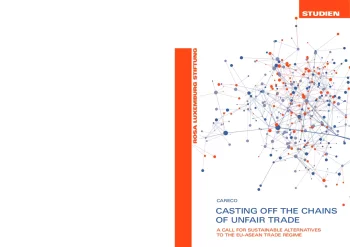Casting off the Chains of Unfair Trade
A Call for Sustainable Alternatives to the EU-ASEAN Trade Regime
This report explores the effects of existing trade agreements between ASEAN and EU states, takes a look at possible effects induced by potential developments of these trade agreements, and discusses alternatives to their approach to organizing ASEAN and EU trade relations.
We seek to offer an understanding of the positions of the various layers and the general mechanisms behind historical and present developments around the emergence of a free trade regime leading us to FTA negotiations between ASEAN and the EU. This has to be contextualized with the general criticism on Free Trade Agreements (FTAs) and the concrete opposition to the FTAs in the ASEAN region.
As we are very aware of the shortcomings of our perspective as researchers from the Global North in approaching this study, we have made the very fundamental decision to be exploratively guided by the perspectives and voices of relevant local actors and international activists. A left vision or alternative to the bilateral or inter-regional trade agreement between the EU and ASEAN can only be developed by including the multiple perspectives of resistance against and development of alternatives to the various mechanisms of exploitation connected to the history and present of free trade and FTAs in particular.
A comprehensive overview of all major political, economic, and social impacts of trade between Europe and the ASEAN and its potential alternatives is impossible. Necessarily, complexity has to be narrowed down without ending in simplistic stencils. Talking about “the EU”, “the ASEAN”, or even about countries is like implying they are consistent monolithic blocs. Instead, all of the related concepts are complex entities with different bodies and diverging interests and perceptions. With all due precision in the presentation, we try not to sacrifice readability and comprehensibility for this circumstance. This kind of reports bears the danger of methodological nationalism, especially when following the perspective of government officials and their announcements. We are aware of this issue and try to highlight other voices and experiences from civil society advocates where possible.
Downloads
-
 Casting off the Chains of Unfair Trade: A Call for Sustainable Alternatives to the EU-ASEAN Trade Regime
Jan Schneider & Nikolai Schnarrenberger (Careco Research Collective)
Casting off the Chains of Unfair Trade: A Call for Sustainable Alternatives to the EU-ASEAN Trade Regime
Jan Schneider & Nikolai Schnarrenberger (Careco Research Collective)
